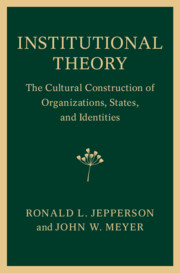Book contents
- Institutional Theory
- Institutional Theory
- Copyright page
- Contents
- Figures
- Preface
- Credits
- Part I Introduction
- Part II Institutional Theory: Its Role in Modern Social Analysis
- Part III The Institutional Level of Analysis
- 6 Multiple Levels of Analysis and the Limitations of Methodological Individualisms (2011)
- 7 The Limiting Effects of Analytical Individualism:
- 8 Reflections on Part III:
- Part IV Institutions of Modernity and Postmodernity: The Construction of Actors
- Part V Conclusion
- Index
- References
7 - The Limiting Effects of Analytical Individualism:
Examples from Macrosocial Change (2007)
from Part III - The Institutional Level of Analysis
Published online by Cambridge University Press: 22 March 2021
- Institutional Theory
- Institutional Theory
- Copyright page
- Contents
- Figures
- Preface
- Credits
- Part I Introduction
- Part II Institutional Theory: Its Role in Modern Social Analysis
- Part III The Institutional Level of Analysis
- 6 Multiple Levels of Analysis and the Limitations of Methodological Individualisms (2011)
- 7 The Limiting Effects of Analytical Individualism:
- 8 Reflections on Part III:
- Part IV Institutions of Modernity and Postmodernity: The Construction of Actors
- Part V Conclusion
- Index
- References
Summary
Discusses empirical examples showing how the preference for individual-level explanation – that is, for psychological, social-psychological, and microeconomic explanation – has limited the explanation of a wide range of macrosocial outcomes: of European economic history, of postindustrial development, of world economic development and globalization generally.
Keywords
- Type
- Chapter
- Information
- Institutional TheoryThe Cultural Construction of Organizations, States, and Identities, pp. 170 - 195Publisher: Cambridge University PressPrint publication year: 2021



